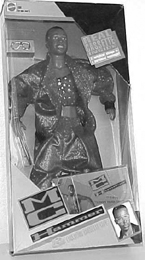Q’s Views
The Commercialization of Hip-Hop
By Quibian Salazar-Moreno
Some hip-hop purists may say it started when Sugar Hill Gang dropped “Rapper’s Delight” in the late 70’s. Others may say it was in the mid-80’s with the success of the “Breakin’” movies and the widespread popularity of breakdancing (it’s really called b-boying). But for me, I think it started in the early 90’s with MC Hammer.
Those benefiting from the commercialization of hip-hop say that it was meant to happen. What is the commercialization of hip-hop? Well, to most hardcore purists, it’s making money off of the art of hip-hop. Making money off the music, getting paid to DJ on the radio and parties, selling pieces of graffiti artwork on canvas, or b-boying for money on 16th St. Mall can be considered commercializing hip-hop.
For me, however, commercialization means watering down the product to make it easier to sell. It’s taking something pure and original and stripping away its main identity so it can relate to a wider audience. I think it’s different than exploitation. I see exploitation as unknowingly being used, while commercialization is knowing and choosing to be used. You could say that hip-hop has been exploited, especially in the 80’s when the young b-boys were told to dance in flicks such as Flashdance, Beat Street, and Breakin to get a couple hundred bucks when the films made millions. But nowadays, everything you see on TV or hear on the radio is created by the choice of the artist with hopes of selling the most records. But before we get there, let’s take it back for a minute.
MC Hammer was born on March 30, 1962 as Stanley Kirk Burrell in Oakland, California. When he was younger, he landed a gig as an Oakland Athletics bat boy and gained a desire for performance when the crowd cheered for him when he danced during breaks in the game. During that time, he was nicknamed Hammer because of his resemblance to baseball great, Hammerin’ Hank Aaron. He always wanted to be a professional athlete but since that never came to pass, Hammer spent three years in the Navy. When he returned he got into the music business.
Heavily influenced by the funk of the 70’s and early 80’s, Hammer recorded his debut album with Felton Pilate of Con-Funk-Shun fame. The project sounded so good that Capitol Records gave him a record deal and released the album Let’s Get It Started in 1988. On the strength of its singles, “Turn This Mutha Out”, and the title track, the album went platinum a year later. |
|
In 1990, Hammer released the hip-hop album to end all hip-hop albums--sales wise. The juggernaut Please, Hammer Don’t Hurt Em’ was lead by the catchy but mind-numbing hit single, “Can’t Touch This”. At this point, however, commercialization didn’t begin. Anyone could have sampled Rick James’s “Super Freak” and have a monster hit. It was what happened after that. Please Hammer, Don’t Hurt Em went on to sell 10 million records and was one of the best selling hip-hop albums of all time.
Of course after such success, many people wanted to cash in and Hammer hooked up a lot of those people. And this is where the  commercialization began. commercialization began.
In the early 90’s you saw Hammer dancing for everyone from Kentucky Fried Chicken to Pepsi. He had a network cartoon called Hammerman and even had an MC Hammer doll. Hammer stripped and cheapened his image and his culture for a quick buck, when he was already doing fine with the music he was making.
So with the success of Hammer, hip-hop became a copycat industry--whatever is successful or popular, do it. Dozens of artists tried to copy Hammer’s dance moves, his clothing, his choruses, and his image. Some succeeded; some didn’t.
The copycat approach is what plagues hip-hop  today and prolongs its commercialization. Copying someone’s style (called biting), negates the artist’s individual style. today and prolongs its commercialization. Copying someone’s style (called biting), negates the artist’s individual style.
If 50 Cent has a huge hit with “In Da Club” or “Candy Shop” the industry will go nuts to get the producer who made the music, copy the images in the video, and imitate the cadences in the song with hopes of replicating the success whether it is part of the artist’s character or not. And artists know what style of music, what producers, or what image fits their personality. So when they knowingly sacrifice their own spirit and attitude for the sake of money, trying to get that Pepsi endorsement or action figure, the commercialization begins. And the corporations eat it up, especially when the artist is willing to do anything to get paid, like tap dance for Kentucky Fried Chicken.
Now don’t get me wrong, I’m not against endorsing products, making money or getting paid for your talent. What I am against is artists sacrificing their integrity to get to that level. Yeah, it’s called selling out.
Editor’s note: Quibian Salazar-Moreno is a freelance writer living in Denver. You can visit his at http://www.qsviews.com.
|
